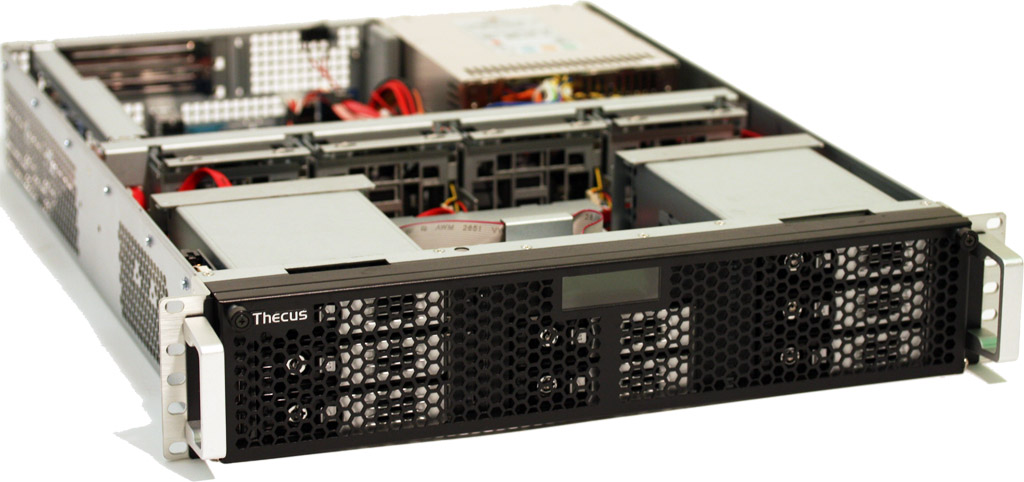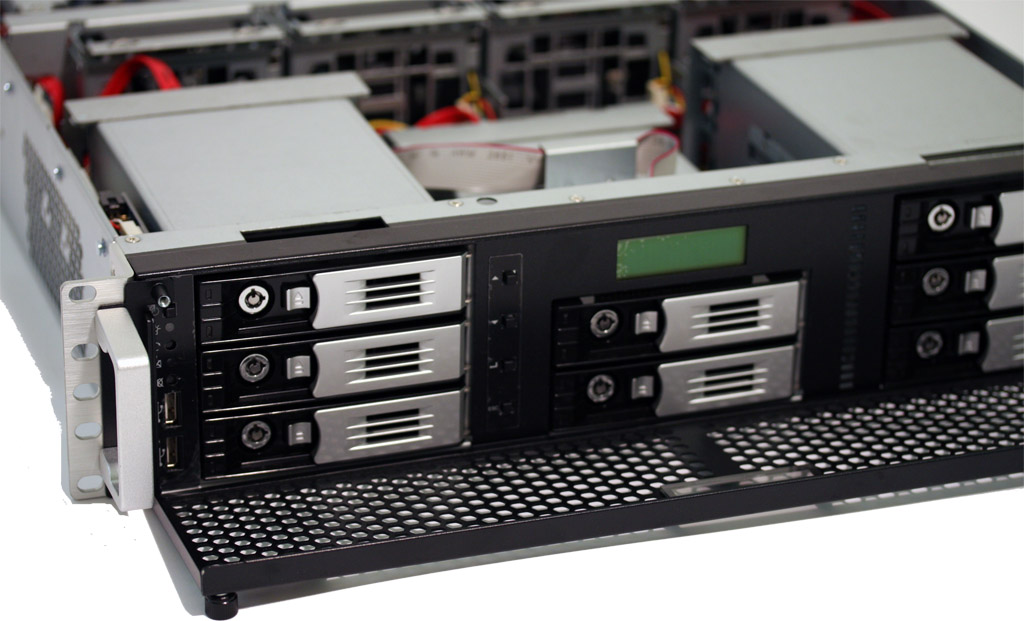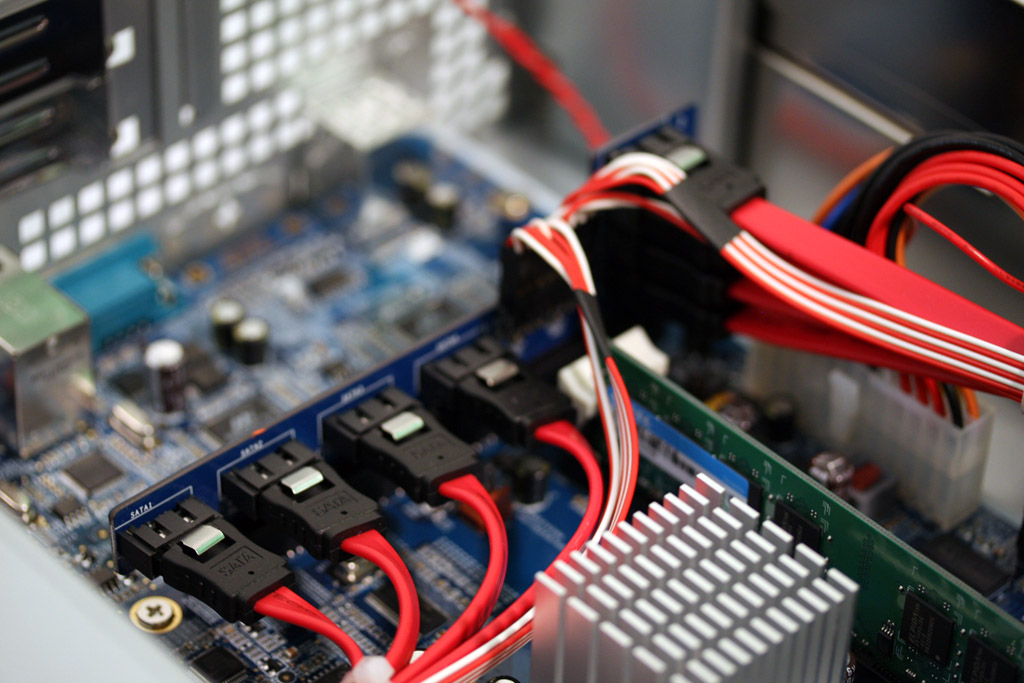Thecus N8800 NAS/SAN: Quick-Look

Introduction
I’m a glutton for storage. Once I decided to digitize my Blu-ray collection and stream movies wirelessly to a theater room, 40GB chunks of space quickly chiseled away at the four 1TB hard drives populating my Thecus N5200 (1TB had already been lost to parity information, and a second terabyte was allocated to iSCSI SAN duties for my workstation). Thus, it became necessary to find a more serious storage server.
Enter The Beast
Now, I’m a little different from most in that I have a Belkin 24U rack in the garage, so it’s fairly easy to add some serious capacity to the network if it’s needed. Most homes aren’t equipped to accommodate rackmount equipment—many SMBs aren’t even set up with racks in dedicated server rooms. And so, the equipment I turned to for this little project isn’t really intended for the home user. You can take it there if you have the infrastructure, of course. But businesses with rack space will be the ones who will likely be interested in the Thecus N8800 I ended up having sent out to look at.
This thing is a substantial piece of hardware, to be sure. It populates 2U of rack space and offers eight 3.5” drive bays compatible with SATA disks. Thecus does sell a SAS-ready version of the enclosure, but it costs a bit more and is only really necessary if you plan to employ SAS storage and need dual DoMs (Disk on Modules).
Up front, you’ll find a thumbscrew-secured mesh, which covers the eight 3.5” hot-swappable drive bays, an LCD readout, menu navigation buttons, a power switch, and a pair of USB 2.0 ports. Around back, you’ll first notice the twin 350W power supplies—a suggestion that the N8800 has enterprise-class underpinnings (though the fact that we’re using SATA hard drives here undermines that a bit). You’ll also find an additional two USB 2.0 ports, an eSATA port, a pair of Gigabit Ethernet jacks, and two full-sized expansion brackets that correspond to a couple of PCI Express x1 slots inside the chassis. Despite this, nothing on Thecus' site suggests that there are upgrades compatible with the N8800, so we'll ignore those expansion slots for now.
A Solid Hardware Foundation
The hardware infrastructure on which Thecus builds the N8800 is decidedly Intel-based. There’s a Celeron M processor, 1GB of DDR2-667 memory, and a pair of Intel Gigabit Ethernet controllers. Plus, you'll find two Marvell four-port storage controllers.
Get Tom's Hardware's best news and in-depth reviews, straight to your inbox.
A riser card in the proprietary motherboard enables eight SATA ports from the Marvell chips. Each drive gets its own port, rather than sharing throughput via a port multiplier on a mid-plane.
Everything about the N8800’s construction exudes quality. The four 80mm Sunon fans blowing air through the 2U enclosure are easily serviceable. Cable routing isn’t meticulous, as you might expect from a storage server that doesn’t utilize a mid-plane, and instead runs every SATA cable from controller to drive (likewise for power). The steel enclosure is solid (albeit heavy as a result) and well-braced against flexing. The fitment of all eight drive bays is precise, and the removable carriages slide into place with a secure click.
-
excalibur1814 Nice article. I'm now off to see the price of these units as I need some serious storage due to possibly storing all my dvds etc.Reply -
thearm "Nice article. I'm now off to see the price of these units as I need some serious storage due to possibly storing all my dvds etc."Reply
LOL How does one get voted down for that? I'm planning on doing the same thing. The net has some strange folks. -
huron Nice. I've been looking at NAS/SAN products for my home for a similar setup to accompany the HTPCs I am building.Reply
Now, just have to check the price and convince the wife that it's "necessary." -
Spanky Deluxe Ouch. Costs about £1200 here in the UK. While its certainly a very nice solution, the more budget conscious might want to invest in a 4U rackmount case, a cheap computer setup with gigabit ethernet and a couple of 4 port SATA cards. Something like that can be had for about £250 before drives (£50 for case, 2x£40 for controllers, £120 for Intel Ion Mobo/Processor + RAM). Obviously not nearly as nice and would need some knowledge of Linux for a decent setup but doable.Reply -
blarger Hey gueys I needed a car to get to work so I started looking around at commuter cars, they worked but I wasnt happy with them so I bought a Porsche 911. It's not really made for the commuter market but I'm going to tell you commuters looking for commuter cars all about it.Reply
It's overpriced, breaks a lot and of course the repair bills are more than what you'd call high. But whatever just wanted to let you know that this site footed the bill for my awesome extravagance so lolol. -
blarger damn wish I coulda worked in that this thing pretty much requires a rackmount setup into the car analogy.Reply



